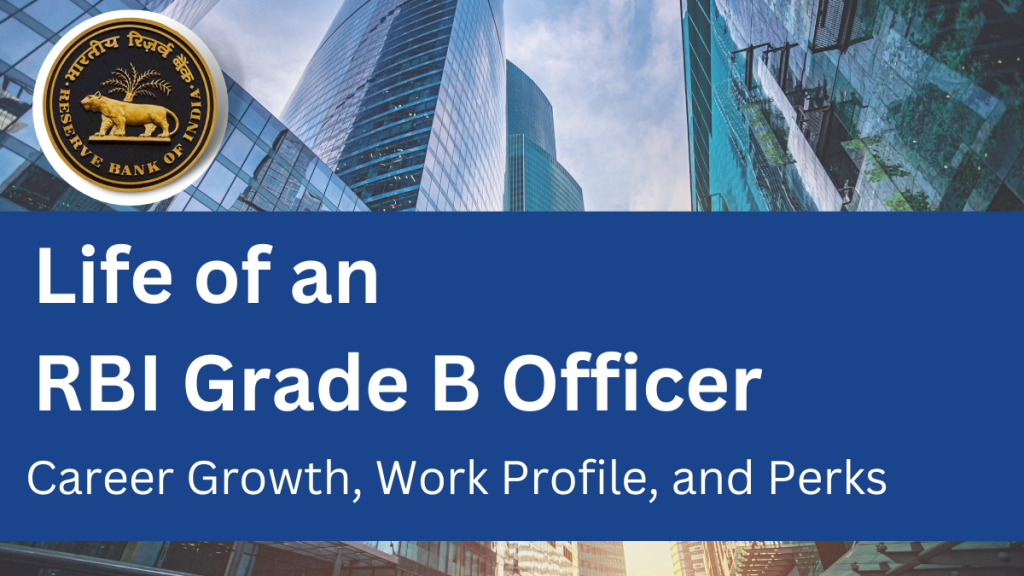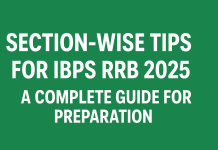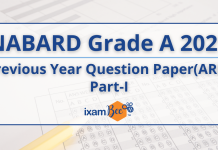Read about Life of an RBI Grade B Officer and RBI Grade B Officer Lifestyle from ixamBee
Choosing a career path is a tough task, as the ensuing journey will shape a significant part of your future. After all, you’ll be spending a substantial chunk of your productive years at work. But imagine a career full of excitement, prestige, and a dash of productivity, all rolled into one. If that sounds like your dream come true, then look no further than the coveted role of an RBI Grade B Officer! With its amazing lifestyle and enviable perks, it’s easy to see why this is one of the most admired and most recommended profiles in the banking sector. So buckle up and get ready for a career that’s anything but conventional!

In this article, we will learn all about the life of RBI Grade B Officer, lifestyle, RBI Grade B working hours, career, RBI Grade B salary, benefits, and departments.
RBI Career Paths
RBI’s career path begins with the support workers or Office Attendants, who are in charge of all clerical work at RBI. RBI recruits for the post of Managers in Grade B, Assistant Managers in Grade A and Office Attendants on a regular basis. Specialized recruitment through exams occurs in RBI Grade B DEPR Department, RBI Grade B DSIM Department, RBI Legal Department and RBI Rajbhasha Department. In this article, we will discuss the job profile of RBI Grade B Officers.
RBI Grade B Lifestyle
Now, let us look at what a regular day is like for employees at RBI. RBI Grade B Officers have a good work-life balance because they work in a stress-free environment. The RBI Grade B working hours are 10 AM to 6 PM, with five days of work per week, making it an optimal working environment.
RBI Grade B Career Growth
The career growth of an RBI Grade B Officer is one of the key attractions for individuals aspiring to join this esteemed institution. With a career in the RBI there is a possibility for employees to get to know some of the world’s most prominent organizations, such as the World Bank and the International Monetary Fund. Furthermore, investment banks are known to provide generous benefits and lucrative opportunities to retired RBI Grade B officers. The RBI Grade B Officer’s career progression has three main stages, with opportunities for promotion and advancement at each stage.
Stage 1: Probationary Phase
Upon joining as an RBI Grade B Officer, individuals undergo a rigorous training program that lasts for around two years. This phase provides them with foundational knowledge and skills required for their future roles in the organization. During this period, they are exposed to various RBI Grade B departments and divisions, gaining a holistic understanding of the central bank’s functioning.
Stage 2: Middle Management Phase
After successful completion of the probationary phase, Grade B Officers are promoted to the middle management level. At this stage, they are assigned to different departments based on their skills and aptitude. Officers may work in areas such as monetary policy, financial markets, banking regulation, foreign exchange management, or research and analysis. This stage offers immense opportunities for specialization and skill development.
Stage 3: Senior Management Phase
The final stage of the career progression for an RBI Grade B Officer is the senior management phase. At this level, officers can rise to become Deputy General Managers, General Managers, and ultimately, Executive Directors and even Deputy Governors. These senior positions come with increased responsibility and decision-making authority, providing ample scope for personal growth and professional achievement.
RBI Grade B Work Profile
Without a doubt, working at RBI as a manager is immensely rewarding because it provides many opportunities for career development as well as life stability. The benefits associated with the work profile of RBI Grade B officers are far superior to those associated with any other government or banking job. The following are some of the advantages of beginning your career as an RBI Grade B officer:
- It will be simple for you to adjust to the work environment provided by RBI. It will always be a Tier 1 city in India in terms of workplace.
- You’ll learn about the country’s economic situation, including inflation, deflation, GDP growth, and GNP, among other things.
- You’ll also be in charge of managing certain government and central bank accounts.
Roles & responsibilities
The work profile of an RBI Grade B Officer is diverse and challenging. They are responsible for various tasks and roles, including:
Formulating and Implementing Monetary Policies
One of the key responsibilities of an RBI Grade B Officer is to contribute to the formulation and implementation of monetary policies. This involves monitoring economic trends, analyzing data, and providing recommendations for interest rate adjustments, liquidity management, and inflation control. Grade B Officers play a crucial role in maintaining the stability of the Indian economy.
Banking Supervision and Regulation
Grade B Officers also play an important role in banking supervision and regulation. They ensure that banks and financial institutions comply with the RBI’s guidelines and regulations. Officers conduct inspections, monitor risk management practices, and take appropriate measures to maintain the solvency and stability of the banking sector.
Research and Analysis
Another significant aspect of an RBI Grade B Officer’s work profile is research and analysis. They are involved in conducting in-depth research on economic trends, financial markets, and banking systems. Officers provide valuable insights and recommendations to senior management and policymakers, helping them make informed decisions.
Conducting Market Operations
RBI Grade B Officers actively participate in conducting market operations such as open market operations, foreign exchange market operations, and managing the government securities market. They play a crucial role in ensuring the smooth functioning of financial markets and maintaining liquidity in the system.
Developing Policies and Regulations
RBI Grade B Officers are also involved in the development and implementation of policies and regulations. They contribute to the drafting of banking and financial sector regulations, aligning them with changing market dynamics and international best practices.
Promotional Avenues For RBI Grade B Officer
Those RBI Grade B officers who want to advance to Grade C officers later will have to take the departmental test after 5 years to be promoted. If you are hired at a young age you will quickly rise through the ranks to deputy governor after passing Departmental exams. In seven years, Grade B officers can advance to Grade C, and in another five years, they can advance to Grade D. The length of your promotion period is also determined by the number of openings and your results. The vast majority of those who start at Grade B advance to CGM (top management). The Regional Director, who looks after the RBI’s functions in a state or region, is also a CGM officer. As stated earlier, just a few people will be chosen to be Executive Director and Deputy Governor level.
RBI Grade B Salary & Perks
The RBI Grade B salary is another very interesting part of employment within the RBI. For RBI Grade B officers, the gross monthly salary comes around to Rs. 1,16,684. Their basic monthly pay is Rs. 55,200 with an increment of Rs. 2,850 every year for 9 years. There are several allowances given to RBI Grade B officers on top of their basic pay, all of which add up together and results in a monthly pay of Rs. 1,16,684. The pay scale, as per RBI for its officers is Rs.55200-2850(9)-80850-EB-2850(2)-86550-3300(4)-99750. you can read more about RBI Officer Salary & Job Profile.
Some perks received by RBI Grade B Officer are:
- Dearness Allowance
- House Rent Allowance
- Family Allowance
- Telephone Allowance
- Conveyance Allowance
RBI Grade B Departments
There are over 30 departments in the Reserve Bank of India. Further, there are a few sections (4–5) in each department, and each section has 4–5 sub sections. So, if you look at the RBI’s organisational structure, you’ll note that there are over 400 work profiles. The Departments are listed below in alphabetical order.
- Consumer Education and Protection Department
- Corporate Strategy and Budget Department
- Department of Banking Regulation
- Department of Banking Supervision
- Department of Communication
- Department of Cooperative Bank Regulation
- Department of Cooperative Bank Supervision
- Department of Corporate Services
- Department of Currency Management
- Department of Economic and Policy Research
- Department of External Investments and Operations
- Department of Government and Bank Accounts
- Department of Information Technology
- Department of Non-Banking Regulation
- Department of Non-Banking Supervision
- Department of Payment and Settlement Systems
- Department of Statistics and Information Management
- Enforcement Department
- Financial Inclusion and Development Department
- Financial Markets Operation Department
- Financial Markets Regulation Department
- Financial Stability Unit
- Foreign Exchange Department
- Human Resource Management Department
- Inspection Department
- Internal Debt Management Department
- International Department
- Legal Department
- Monetary Policy Department
- Premises Department
- Rajbhasha Department
- Risk Monitoring Department
- Secretary’s Department
- Central Vigilance Cell
RBI Offices in India
In the RBI, there are two types of offices. The central office is in Mumbai, and the Regional Offices (RO) are mainly in state capitals, such as New Delhi, Kolkata, Chennai, Mumbai Regional Office (MRO), Hyderabad, and Bangalore. The full list is available on the RBI’s website.
These two types of officers have very different types of employment. Central Office Departments are primarily responsible for the overall management of related functions, such as coordinating the activities of all regional offices’ concerned departments. It’s more a desk job with a lot of communication with state governments, federal departments, and numerous RBI regional offices.
The Principal Chief General Manager (PCGM) leads the Central Office Departments (COD), which are managed by 1 to 3 CGMs, based on the workload of the department. To be clear, all of these officers began their careers at some point with RBI as Grade B officers.
Regional Directors, who are PCGM/CGM level officers, lead the Regional Offices (RO). His role is similar to that of the State Government’s Chief Secretary. This protocol is not specified anywhere, but it is followed at all functions and meetings of the State Government and the RBI.
Urban Banking Supervision Department
The role of the Urban Banking Supervision Department is to audit different banks that the General Manager has assigned to them. The Banking Regulation Act, 1949, and certain provisions of the Reserve Bank of India Act, 1934, are used to carry out this on-site inspection. Subsequently, officers must adhere to some of the Income Tax Act, FEMA’s, and Money Laundering Act’s rules.
The main goal of the inspection is to see whether the banks are operating in accordance with the Banking Regulation Act of 1949. Since banks handle public funds, it is the responsibility of RBI to protect depositors’ interests.
The cash vault, KYC AML guidelines, the bank’s credit appraisal system, its Information Technology Policy, the overall security of the branch, the functioning of the Board of Directors and intervention in the bank’s day-to-day operations, and adherence to the RBI’s various circulars are all important areas on which inspectors should concentrate during their inspection.
Officers must write inspection reports and prepare bank balance sheets in accordance with Reserve Bank format based on these criteria.
Further Opportunities
- Officers in the RBI have a variety of options for further education at any university in the world
- Officers may apply for a variety of scholarships that provide full or partial support for future studies as well as research leave
- Many other career paths are also available after working for the RBI, including the World Bank, IMF, Bank of International Settlements in Switzerland, and the Ministry of Finance, Government of India
- They are also eligible to serve on the boards of directors of top-tier commercial banks
- Multiple post-RBI Consulting opportunities in Investment Banking are also an advantage availed by the Grade B officer
RBI Grade B Preparation
How to prepare for the upcoming RBI Grade B Exam 2024?
The first step to living the life of an RBI Grade B Officer is to prepare for the exam. There are many ways to prepare for the RBI Grade B exam 2024. However, the best way to prepare for the RBI exam 2024 is with XtremeBee. Therefore, if you want to learn all about how you can benefit from this program that offers a holistic 360-degree preparation approach, follow the link or watch the video below.
We wish you the best, always.
To help you prepare 50% faster for competitive exams, ixamBee provides a free Mock Test Series and all the Current Affairs in English and Current Affairs in Hindi in the BeePedia capsules for GA Preparation. You can also get the latest updates for Bank PO, Bank Clerk, SSC, RBI Grade B, NABARD, and Other Government Jobs.
Also Read
Success Stories: Meet RBI Grade B Officer Manoj (Neither an Engineer nor a UPSC dreamer)!
13 Mistakes to Avoid for RBI Grade B Officer Preparation (Part 1)
2024 RBI Grade B Exam Dates Out Now!
















Thank you for the knoewledge